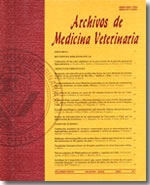Ocurrence and caracterization of bovine abortion caused by Brucella abortus infection in southern Brazil
Main Article Content
Abstract
Brucellosis caused by Brucella abortus infection is a contagious zoonotic disease that causes abortions in cows, as well as joint and reproductive alterations in bulls. This study reports that eight (1.92%) out of a total of 469 aborted bovine fetuses analysed in a time frame of nine years were caused by B. abortus infection. The diagnosis was based on macroscopic, histological, microbiological, serological, immunohistochemical, and molecular findings. The gestational age of the fetuses studied ranged from 6 to 9 months. The main gross findings were purulent discharge from the nasal cavity, trachea and bronchi; pleural and pericardial fibrin deposits; and non-collapsed lungs with white spots in the parenchyma, and red areas in the apical lobes. Intercotyledonary areas of three placentas examined exhibited reddened areas, and the cotyledons exhibited well-defined, yellowish-white round areas with thickened walls on their surface. Microscopically, the most frequently observed lesions were necrosuppurative bronchopneumonia, interstitial pneumonia, and necrosuppurative placentitis with areas of vasculitis, mineralization, and thrombosis. Brucella abortus was isolated from fetal tissues of seven of the nine cases investigated. Immunohistochemical tests were positive in four cases, and PCR detected B. abortus genetic material in three cases. Infection by B. abortus should be considered a possible cause of abortion in cattle in southern Brazil.

